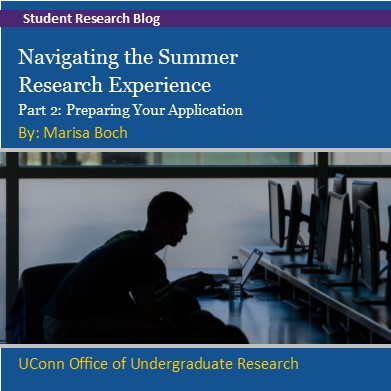By: Marisa Boch, OUR Peer Research Ambassador
Preparing Your Application
Some programs have different formats, but as a general rule of thumb your application will include a personal statement, letters of recommendation (2), an official transcript, and (occasionally) a resume:
1) Personal Statement: The program instructions for a personal statement will probably resemble something along the lines of: Describe in ### words your educational and professional goals and how your participation in the XYZ Program will assist in meeting your goals. Be sure to articulate your qualifications and your reasons for wishing to participate in this program (Adapted from Harvard Summer Research Program in Kidney Medicine Application 2018). Start your personal statement early on.
Allow time for introspection. What type of research are you interested in (what are you truly passionate about)? What are your educational and professional goals? Do you want to go to graduate school to get your Master’s or a Ph.D.? In what field would these degrees be in? Do you want to go to medical school, dental school, or law school? Do you want to work in R&D in industry? Be honest.
Allow time for researching the program. In order to say how the program will help you to meet your goals, you should have a full understanding of the program and the research opportunities it offers. Read about the departments that are participating in that particular research program and search for research opportunities within your area of interest. For instance, in my application to UConn Health’s Undergraduate Summer Research Internship Program in the Biological and Biomedical Sciences, I indicated that “conducting an individual investigation into skeletal biology and regeneration would provide both validation for my research interests and insight into further opportunities for research in the field.” When saying how the program will help you meet your goals, think about the transferable skills you will gain (e.g., critical thinking skills), as well, and how those skills can help you in your future educational and professional endeavors.
Do not be afraid to brag. If you have research experience, talk about it! Provide your elevator pitch for the research you have conducted in the past and what you have gained from those experiences. Discuss how your course work, including laboratory courses, has provided you with the knowledge and skills necessary to, in my words, “fully reap the benefits of a research internship.”
Finally, allow time for revising. Have a family member or friend, or even a faculty member, look over your personal statement and offer feedback. It may take multiple drafts to put together a strong personal statement, especially when confined to a word limit, but it will pay off. Once you put together one personal statement, it is easy to tweak it for each program, so put in the effort early on!
2) Letters of Recommendation: Choose faculty members who are familiar with you and your assets. If you are involved in research, your research advisor is the first person you should ask, as they can comment on your critical thinking and laboratory skills and what you contribute to the laboratory. For your other recommender, choose a faculty member who knows you, as a student and as a person. Even if they are not within your field, there is more value to having a personal letter of recommendation from someone who knows you than a faculty member who does not.Request letters of recommendation early! As mentioned above, it is most professional to ask faculty members at least 1 month prior to the deadline. I have found that many faculty members are quite accommodating, however, and are even able to write letters if requested 2 weeks before the deadline. If you request a letter early on, perhaps send a follow-up email as the deadline approaches to confirm that they are still willing and able to submit the letter.
When requesting these letters, a personal meeting is always nice, but sometimes an email is most feasible, and that is okay. Phrase your request as, “I was wondering if you would be willing and able to write a letter of recommendation on my behalf.” Indicate that you feel that they know you as a (student, researcher, etc.) and that their input would be truly valued. It is important that you choose your words such that you give them the option of writing the letter and so that they know that you put a great deal of thought into choosing them as a prospective recommender.
3) Transcripts: Official transcripts are requested through StudentAdmin, and it can take 1-2 weeks for the request to be processed, and perhaps even longer for the program to receive the transcript. To be safe, request transcripts several weeks in advance!
Submitting and Waiting
After you submit your application, several weeks may pass before you receive any correspondence. When you do receive that email (likely around mid-March), do not be discouraged if you see the words, “we regret to inform you.” It only takes one email that reads “congratulations” to secure a research opportunity!
Check out the two other segments in this special 3-part blog:
Marisa Boch is a senior double majoring in Chemical Engineering and Molecular & Cell Biology. Click here to learn more about Marisa.